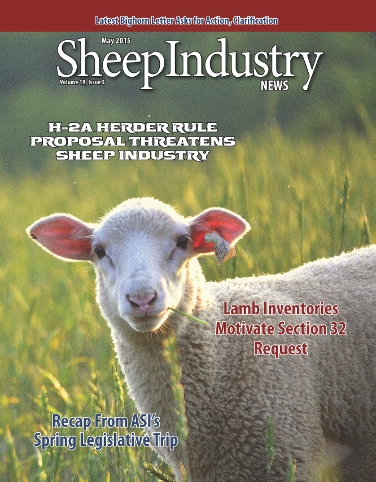In my previous column, I noted that we were just days away from joining forces with 50-plus other dedicated volunteer leaders who descended on Washington, D.C. We did so in an effort to express the priorities and shape legislation beneficial to the American Sheep Industry.
So, I thought a brief report on the outcome of those efforts was due.
Overall both legislators and volunteers were very supportive and positive. Individual legislative leaders were supportive and sympathetic to the struggles of the American food producer known as America’s Farmers and Ranchers. Jim Richards and the staff at Cornerstone Government Affairs put together a most impressive legislative briefing booklet and handouts.
The briefing sheets included excellent pertinent information that capsulized issues confronting American sheep producers in the USA. The reverse side included all the information, language, requested appropriation amounts and responsible governmental agency with oversight. This well-organized information provided our legislative leaders with all the necessary information and tools required to place your request for support in front of leaders of Appropriations and other necessary committees.
Jim and staff did all the research and leg work necessary to put forth your priority requests. This was all delivered in a highquality folder portraying images of sheep and wool each of you would have been proud to be associated with.
Thank you, Jim and Cornerstone staff – we were all proud to handout the all-encompassing briefing packets you provided this noble industry.
The morning of March 24, Ken Wixom, Utah’s delegation and I joined the Public Lands Council and National Cattlemen’s Beef Association leaders at NCBA headquarters. We hosted Chairman Rob Bishop from Utah’s 1st Congressional District. Rep. Bishop serves as the Chair of the House Natural Resources Committee and also serves on the Public Lands and Environmental Regulation Sub Committee. Rep. Bishop spoke frankly about his frustration with the workings and regulatory overreach of numerous federal agencies. We took the opportunity to make him aware of three of our most important issues today. I spoke of the federal government’s efforts to close the U.S. Sheep Experiment Station. I focused on the history, research, uniqueness and its ability to solve the issues of the day with the interaction of bighorn and domestic sheep. I also highlighted the 50 years of data collected by the USSES on sage grouse. Data at the station demonstrates bird and leek counts thrive under properly managed grazing.
The other issue we highlighted was the U.S. Forest Service’s attempts to remove domestic sheep from federal grazing lands. Lastly, Tom Kourlis and I discussed the importance and need for H-2A Special Procedures to sheep producers around the country.
Later that morning, we chose to attend the PLC meeting. The first legislative speaker, Congressman Greg Walden from Oregon, was very refreshing to listen to. He understands the issues has a vision for solutions and is dedicated to assisting the American farmer and rancher.
Congressman Mark Amodei (NV), who spoke at our ASI Industry Convention in Reno in January and is a well-versed critic of the Forrest Service and Bureau of Land Management, also took the podium. He reiterated the theme presented at Reno that the biggest user/predator/habitat destroyer of all public lands is wildfire. Congressman Amodei is persistent in his pursuit of the agencies to address this as part of their management plan.
I took the opportunity to highlight the USSES, Forrest Service, bighorn and H2A issues with each of these two gentlemen in that public forum.
Later on the 24th, Burdell Johnson and I had our first congressional visit with Congressman Kevin Cramer (ND). Meetings with both North Dakota Senators John Hoeven and Heidi Heitkamp followed the next day. All three meetings were well received and pledged support of our priority issues. On the evening of the 25th, ASI and Cornerstone hosted the Annual Lamb Reception. It was well attended and featured quality lamb products donated by Kevin Quam of JBS. A big “thank you” to Kevin and JBS for their support.
I also want to thank Laura Gamper of Cornerstone. She is truly a logistics expert with boundless energy.
Mark your Calendar for next year’s spring legislative trip. This event is an opportunity to verse yourself in history, public service and representative government granted to each of us by some very wise men in a Philadelphia Hall the year of 1776.
Section 32 lamb purchase
Shortly after the Washington trip, ASI’s executive board met to consider a request to USDA to provide a section 32 commodity purchase program for lamb. Lamb companies have visited with the ASI office about the opportunity for USDA buy excess cooler inventories of domestic lamb for distribution to the nation’s food banks.
Cooler and freezer inventories are said to be up 40 percent over a year ago. The executive board in a conference call acted on the request and approved a motion to pursue. The details highlight the need for much expedience to allow the purchase of lamb to occur in the months of June, July and August. This message has been conveyed to USDA.
Because of funding restrictions of the Wool Trust, ASI has limited tools to affect demand. A Section 32 purchase request is one of the few tools available to ASI to impact the price that farmers and ranchers receive for their lambs. Still pending is a possibility to testify in front of the House Agriculture leadership on the importance of Mandatory Price Reporting for livestock.
Again, thanks to all who attended the Washington legislative trip and thank you for your continued membership and support of the sheep industry.



